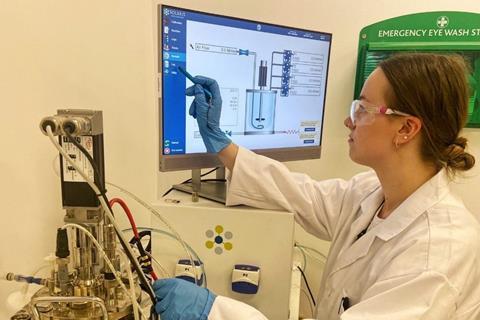Emma collects and processes precious metals that are extracted from electronic waste products
Hi, I’m Emma and I work as a bioleaching lab technician at Network 2 Supplies (N2S). I am doing a level three HNC in order to become a qualified lab technician.

What does your company do?
N2S is a sustainable IT and electronic waste recycling company. We are passionate about developing the circular economy by tackling the ever-growing problem of electronic waste.
One of the ways we do this is to extract precious metals from electronic waste products using bacteria – a method known as bioleaching. We use the following closed-loop cycle:
- Companies bring their electronic waste to us.
- We dismantle and divide the electronic waste into its group of interest and reuse.
- The printed circuit boards within the electronic waste are shredded and dissolved using bioleaching.
- Once in solution, the metals are extracted. For example, copper foil is created.
- Extracted metals are reused elsewhere, closing the cycle. For example, copper foil is put back into a printed circuit board which could go in eg, a microwave.
What does a bioleaching lab technician do?
A typical day for me is to harvest and process gold that is recovered via the bioleaching process. I carry out duties in the laboratory such as recording and monitoring scientific data and I also prepare stock solutions and follow standard operating procedures. I make sure that all my instruments are calibrated correctly and in line with standard operating procedures as this is extremely important for accuracy in results due to standard error. As well as this, I keep the laboratory clean and orderly so that it is safe and efficient. I contribute to this by sterilising biochemical waste using an autoclave (a sterilising machine).
How does your work affect the world around us?
I am helping to build a circular economy and reduce electronic waste by extracting and reusing the copper from unwanted devices for reuse in other electronic products. In addition, bioleaching offers an environmentally friendly alternative to mining metals. Copper mining releases poisonous sulfur dioxide emissions which harm the environment and can cause health problems for miners; bioleaching avoids this process as well as reducing the carbon footprint.
What inspired you to work in chemical science?
I chose chemistry because it opens the doors to multiple opportunities and different routes into science, such as pharmaceuticals, organic chemistry and more. Chemistry can fix a lot of the problems that we face today and make the world a better place and, in a small way, I contribute to that through the work that I am doing.
How did your qualification help you to get your job?
My level three applied science course was split into two years; the first year was applied science and the second year was a chosen biomedical route. This helped me get my job because it familiarised me with working in the science industry as well as more practical, hands-on science work. During one of the units, we looked at procedures and communications. This included hierarchy within laboratories as well as regulations and legislations.
On a more practical level, I became familiar with lab equipment and techniques such as mass spectroscopy. The course gave me a foundation and familiarised me with the science industry plus the science theory in order to have enough understanding to take this to the next level.
Salary range and qualifications required
Minimum qualifications: Five GCSEs (preferably maths, english and science) plus an A-level that’s preferably (but not necessarily) science.
Skills needed for the role: Teamworking skills, reliability, understanding of laboratory safety, keeping to deadlines and good technical skills.
Starting salary range: The starting salary for an apprentice is £18,000 per annum. Once fully trained and qualified, this will increase.
What do you like most about your job?
I love that I can be a part of something that gives back to the environment and pioneers a brighter future for my generation. I also love that I can learn and earn a wage at the same time. I can strengthen my practical, “hands-on” skills as well as enhance my knowledge.
What advice would you give to a young person considering a career in chemical science?
Things don’t always go to plan in chemistry and that’s all part of learning. Some things can be complicated to understand but there is a great deal of information online that has helped me to strengthen my lab skills and knowledge.
What are your plans for the future?
I’m not entirely sure what I see myself doing in the future. I will finish my HNC and hopefully work my way up within N2S.
Want to know more?
- Browse the N2S website to find out more about the company and how to get involved with this career path.
- Check out this article to see how N2S is tackling electric waste.
- Find out about HNCs on our higher education options page.
- Investigate apprenticeships on our website or on GOV.UK.
First published in October 2021













